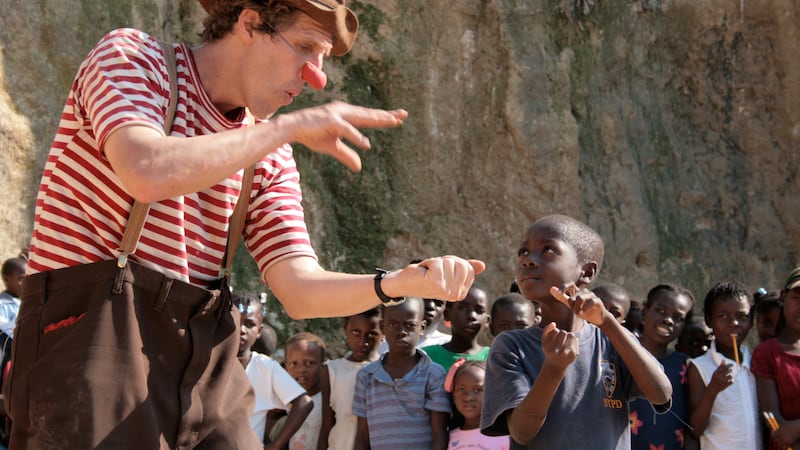Sending clowns to crisis zones seems counterintuitive. David Lichtenstein disagrees.
"We're self-supporting, and we'll make everybody in your community laugh really hard for an hour," Lichtenstein says he tell skeptics. "They will love it, and after you see it, you will love it."

Lichtenstein, who's 57 years old, has clowned in crisis zones for almost two decades. He's been on almost a dozen trips to five different countries on four different continents. Lichtenstein heads the Portland chapter of Clowns Without Borders, which is holding its 19th annual show and fundraiser this week. But Lichtenstein was going on clowning trips before Clowns Without Borders was even founded. The first Portland clowning-in-crisis benefit show was held in Lichenstein's living room in 1999.
The groups perform in hospitals and small towns, but they also give clowning lessons to hospital staff or to the local organizations that brought them wherever they are. Lichtenstein says what they do is better described as "physical comedy" than clowning. It's classic slapstick gags, but there's no white makeup or painted-on smiles, and they don't always wear red noses.
WW talked to Lichtenstein about what it's like to be a clown in a crisis zone.
WW: How do you decide which places to go to?
David Lichtenstein: We always only go to places where we're invited. We're often working where people aren't sleeping in their usual homes and where kids are often having trouble sleeping at all after trauma, but if we can make them laugh really hard for an hour and a half and have a great time. Once we start telling these other helping organizations on the ground, sometimes they don't grab onto the idea until they take us out to the community and see it.

Do you have to think about cultural sensitivity?
Physical comedy works everywhere, it's universal. But we definitely have to change a show depending on where we go. We know when we go to Palestine, which I did in 2012—that was an intense trip—that you have to be more careful with man/woman things. Whereas in Haiti, we were doing a routine where I would be dressed as a woman, and Lydia, who's a woman, would be dressed as a man, and we would get a volunteer to dance with us, and they loved that. But that wouldn't fly in Palestine.
Is it ever hard to be funny when you're performing in kind of intense situations?
We get really enthusiastic audiences. In the places we go to, they don't get to see as much entertainment as people here, and they're not as screened out or computered out as people are here. So, generally, it's easier audiences, and that's maybe one reason why we have only done a moderate amount of domestic projects over the years.

Have there been any shows that didn't go over well?
One time, we were doing a show in Chiapas, Mexico, during the Zapatista wars way off the road, up high in the mountains. In the middle of the show, this drunk starts screaming and goes wandering off. Then later he comes back and he's swinging a machete, goes to the middle of the crowd and comes right into our show. And we just backed away, and then he goes back out through the crowd again, and the crowd just parted like the Red Sea for him twice. He goes off, and about half the audience follows him, and the other half stays watching us, and then the people drift back to us. We just sat down on our suitcases, had a drink of water, said, "OK, you guys want to restart?" By the time we finished the show, they had him corralled into a little tiny village cell.
You wrote in a blog there was one show where kids in the audience threw rocks at you?
Yeah, that was a fun show. That was our first show in Guatemala. It was in a suburban village that was wiped out by a mudflow, where it's 7,500 feet in the mountains and we're on the mudflow. The mudflow is volcanic sand, so it's just blowing sand in your eyes and in your ears, in your nose and all the kids had respiratory infections. But they were just wild, so a couple kids got into throwing pebbles at us. A lot of them did that for a while, but they were having a great time, so we just kept going.
Have you dealt with people who are skeptical of the benefits of clowning
in crisis zones?
There's a feature film [Send in the Clowns] that was made about our work in Haiti. It's a terrifying film for Clowns Without Borders' work because they actually attack: "Are these and NGOs helping Haiti at all and clowning, that's ridiculous." The organization that sponsored [Clowns Without Borders] to teach these wonderful workshops to the caregivers for two weeks, they pulled out. They pull out and disappear and fire all those people. [A year later] the filmmakers go back and see. They ask them about the clowns, and they say, "No, that was the best thing we ever did." A few of us clowns who were watching were like, "Phew, we thought they were going to open us a new one there for a minute."
SEE IT: The Clowns Without Borders Benefit Show is at the Alberta Rose Theater, 3000 NE Alberta St., albertarosetheatre.com. 8 pm Friday, Feb. 9. $28-$50.
